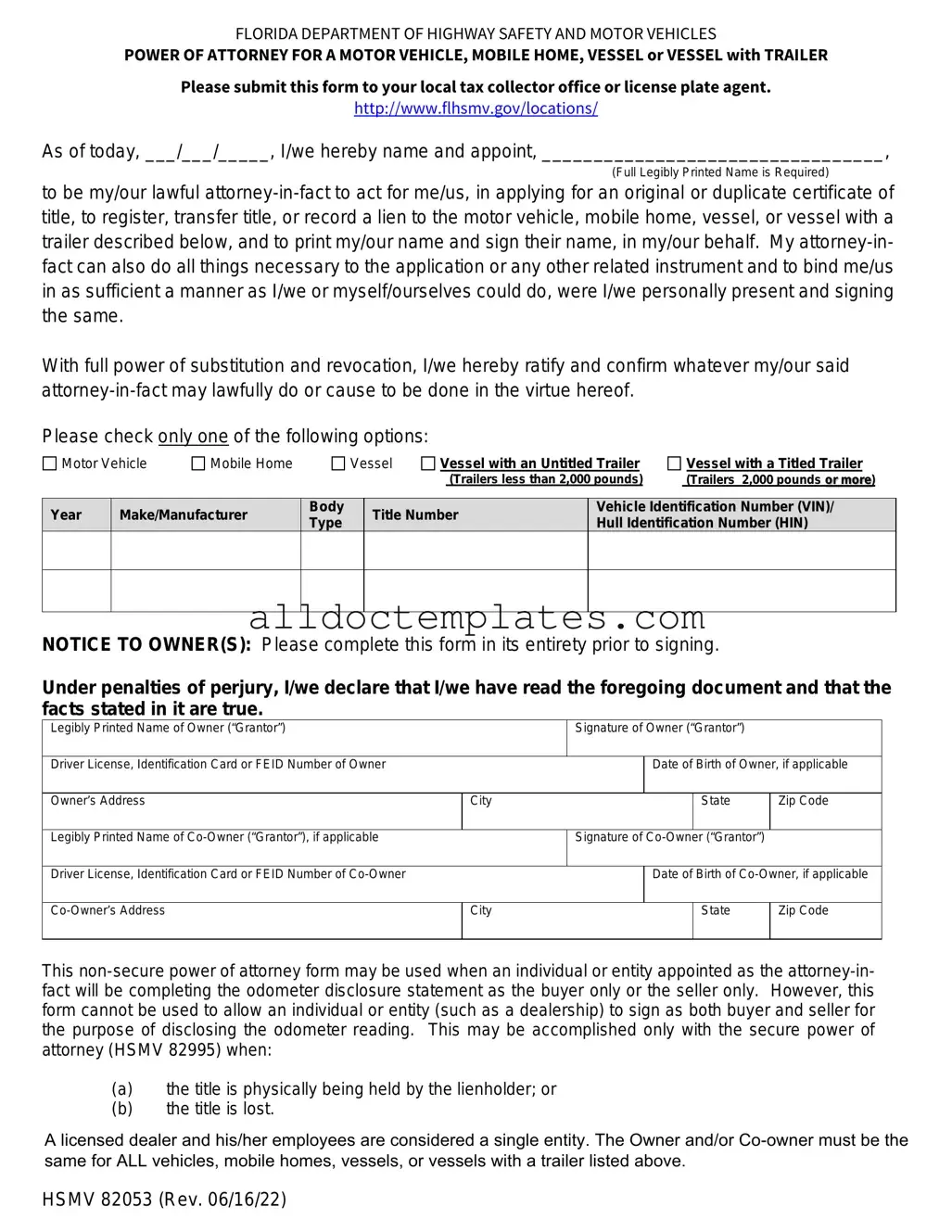Fill in a Valid Florida Vehicle POA form 82053 Form
Document Sample

FLORIDA DEPARTMENT OF HIGHWAY SAFETY AND MOTOR VEHICLES
POWER OF ATTORNEY FOR A MOTOR VEHICLE, MOBILE HOME, VESSEL or VESSEL with TRAILER
Please submit this form to your local tax collector office or license plate agent.
http://www.flhsmv.gov/locations/
As of today, ___/___/_____, I/we hereby name and appoint, _________________________________,
(Full Legibly Printed Name is Required)
to be my/our lawful
With full power of substitution and revocation, I/we hereby ratify and confirm whatever my/our said
Please check only one of the following options:
Motor Vehicle |
Mobile Home |
Vessel |
Vessel with an Untitled Trailer |
Vessel with a Titled Trailer |
|
|
|
(Trailers less than 2,000 pounds) |
(Trailers 2,000 pounds or more) |
Year
Make/Manufacturer
Body
Type
Title Number
Vehicle Identification Number (VIN)/
Hull Identification Number (HIN)
NOTICE TO OWNER(S): Please complete this form in its entirety prior to signing.
Under penalties of perjury, I/we declare that I/we have read the foregoing document and that the facts stated in it are true.
Legibly Printed Name of Owner (“Grantor”) |
|
Signature of Owner (“Grantor”) |
|
||
|
|
|
|
|
|
Driver License, Identification Card or FEID Number of Owner |
|
|
Date of Birth of Owner, if applicable |
||
|
|
|
|
|
|
Owner’s Address |
City |
|
|
State |
Zip Code |
|
|
|
|
|
|
Legibly Printed Name of |
|
Signature of |
|
||
|
|
|
|
||
Driver License, Identification Card or FEID Number of |
|
|
Date of Birth of |
||
|
|
|
|
|
|
City |
|
|
State |
Zip Code |
|
|
|
|
|
|
|
This
(a)the title is physically being held by the lienholder; or
(b)the title is lost.
A licensed dealer and his/her employees are considered a single entity. The Owner and/or
HSMV 82053 (Rev. 06/16/22)
Document Information
| Fact Name | Details |
|---|---|
| Form Title | Florida Vehicle Power of Attorney (POA) Form 82053 |
| Purpose | This form allows an individual to authorize another person to act on their behalf regarding vehicle-related matters. |
| Governing Law | Florida Statutes, Chapter 319, which covers the transfer of title and registration of vehicles. |
| Who Can Use It | Any Florida resident who needs to appoint an agent for vehicle transactions can use this form. |
| Signature Requirement | The principal must sign the form in the presence of a notary public. |
| Agent's Authority | The appointed agent can handle tasks such as title transfers, registration, and other vehicle-related transactions. |
| Expiration | The authority granted remains in effect until revoked or until the specified transaction is completed. |
Florida Vehicle POA form 82053 - Usage Guidelines
Completing the Florida Vehicle Power of Attorney (POA) form 82053 is an important step for individuals who need to designate someone else to act on their behalf regarding vehicle-related matters. This process ensures that your wishes are carried out smoothly and legally. Once the form is filled out, it will need to be signed and submitted to the appropriate authorities.
- Begin by obtaining the Florida Vehicle POA form 82053. You can find it online or at your local Department of Motor Vehicles (DMV) office.
- At the top of the form, enter the name and address of the person granting the power of attorney. This is typically the vehicle owner.
- Next, provide the name and address of the individual you are appointing as your attorney-in-fact. This person will have the authority to act on your behalf.
- In the designated section, specify the powers you are granting. This may include tasks such as registering the vehicle, transferring ownership, or obtaining a title.
- Include the vehicle information. This includes the make, model, year, and Vehicle Identification Number (VIN) of the vehicle in question.
- Sign and date the form at the bottom. Your signature must match the name provided at the top of the form.
- Have the form notarized. This step is crucial to ensure that the document is legally binding.
- Make copies of the completed and notarized form for your records and for the attorney-in-fact.
- Submit the original form to the appropriate DMV office or relevant authority as required.
Common PDF Forms
Odometer Statement Indiana - Include this statement in your vehicle transaction to enhance trustworthiness.
I-983 - Employers must explain how they will provide mentorship.
A Colorado Medical Power of Attorney form is a legal document that allows an individual to designate someone else to make medical decisions on their behalf if they become unable to do so. This important tool ensures that a person's healthcare preferences are honored, even when they cannot communicate them. Understanding how to properly complete and utilize this form is essential for anyone looking to safeguard their medical choices. For additional resources, you can visit Colorado PDF Templates.
Florida Realtors Lease Agreement - It requires both parties to provide their names and signatures to validate the lease.
Dos and Don'ts
When filling out the Florida Vehicle Power of Attorney (POA) form 82053, it’s important to follow certain guidelines to ensure the process goes smoothly. Here’s a helpful list of things you should and shouldn’t do.
- Do read the instructions carefully before starting to fill out the form.
- Do provide accurate information about the vehicle and the parties involved.
- Do sign and date the form where indicated.
- Do keep a copy of the completed form for your records.
- Do check for any additional requirements specific to your situation.
- Don't leave any sections of the form blank unless instructed.
- Don't use white-out or any correction fluid on the form.
- Don't forget to have the form notarized if required.
- Don't submit the form without double-checking for errors.
- Don't assume that the form is valid without proper completion and signatures.
Common mistakes
-
Missing Signatures: One of the most common mistakes is forgetting to sign the form. Without a signature, the document is not valid.
-
Incorrect Information: Filling in incorrect details, such as the vehicle identification number (VIN) or the owner's name, can lead to complications. Always double-check this information for accuracy.
-
Not Specifying the Authority: The form allows you to specify what powers you are granting. Failing to clearly define the authority can result in misunderstandings later on.
-
Omitting Dates: Dates are crucial. Not including the date of signing can make the form invalid, as it is important for tracking the authorization period.
-
Not Providing Identification: Some people forget to include a copy of their identification. This can be necessary to verify the identity of the person granting the power of attorney.
